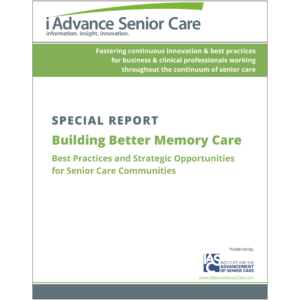New dementia care rules go into effect in Massachusetts
Employees working in nursing home dementia units must have at least eight hours of initial, specialized training and four additional hours of dementia-related training annually under new rules that take effect in Massachusetts March 1. The requirement applies to direct care workers and activities directors in dementia units as well as supervisors of direct care workers in both dementia and traditional units.
Training is just one of four areas covered by the new rules, put forth by the state Public Health Department under requirements of 2012 legislation. The Massachusetts Public Health Council unanimously approved them Feb. 12. Previously, no specific requirements governed the care of those with dementia or Alzheimer’s disease residing in Massachusetts nursing homes.
Other requirements specified in the regulations relate to activities, disclosure statements and facility design:
- Each facility with a dementia unit must employ a therapeutic activities director who is 1) certified as a recreation therapist or activities professional or 2) has two or more years of experience in a recreational program for patients or residents or 3) is a qualified occupational therapist or assistant.
- Dementia units every day must provide at least eight hours of therapeutic activities, six of which must be planned, posted and documented and two of which can be unplanned. All activities must provide cognitive stimulation and have the goal of maintaining physical and emotional wellness.
- All nursing homes advertising dementia-specific care must conspicuously post and also make available to the general public and current and potential residents a disclosure statement detailing all dementia care and services provided, staffing levels, activities hours and other relevant information.
- Dementia units must offer a home-like environment with a common area for meals, activities and resident relaxation and congregation. Doors must be able to be secured to prevent wandering. Also, units must have outdoor areas for residents to walk, assisted or unassisted, with fencing or barriers to prevent wandering. Unit lighting, décor, noise control and color scheme must reflect best practices in meeting the needs of those with dementia or Alzheimer’s disease.
Read details of the regulations on the website of the Alzheimer’s Association’s Massachusetts/New Hampshire Chapter.
I Advance Senior Care is the industry-leading source for practical, in-depth, business-building, and resident care information for owners, executives, administrators, and directors of nursing at assisted living communities, skilled nursing facilities, post-acute facilities, and continuing care retirement communities. The I Advance Senior Care editorial team and industry experts provide market analysis, strategic direction, policy commentary, clinical best-practices, business management, and technology breakthroughs.
I Advance Senior Care is part of the Institute for the Advancement of Senior Care and published by Plain-English Health Care.
Related Articles
Topics: Regulatory Compliance











